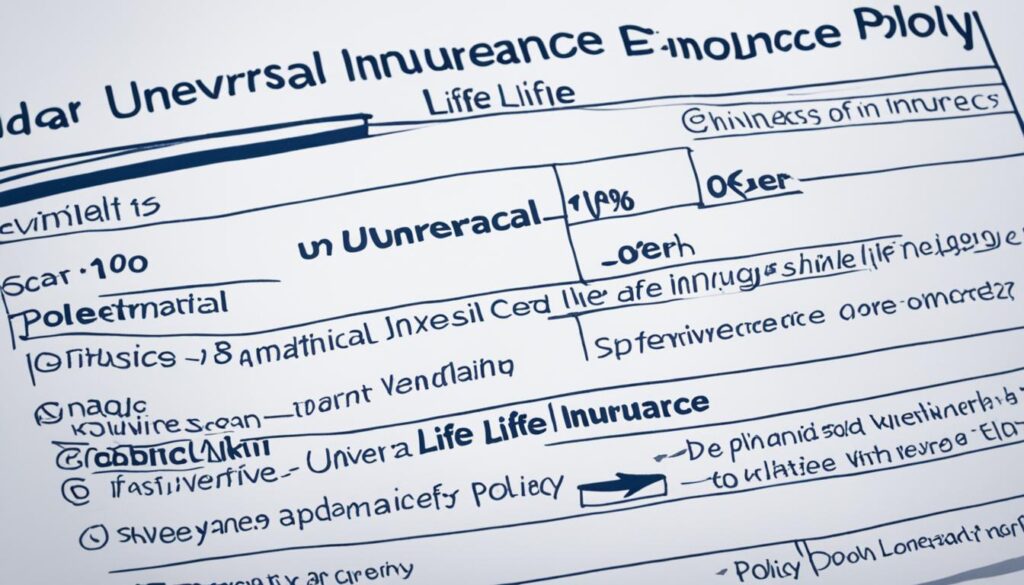Best Universal life Policies insurance offers a middle ground between term life and whole life insurance. With universal life insurance, you have flexibility in choosing the benefits that suit your needs. You can adjust premium amounts, total amount of insurance, and length of coverage. Universal life provides long-term financial protection for your loved ones and the potential for cash value growth over time. New York Life Insurance Company, with over 175 years of experience, is a reliable provider of universal life policies.
- Universal life insurance offers flexibility in premium amounts, coverage, and length of coverage.
- It provides long-term financial protection and the potential for cash value growth.
- New York Life Insurance Company is a reputable provider of universal life policies.
- Universal life insurance allows you to customize your coverage to meet your needs.
- Universal life insurance is a reliable option to ensure a secure future for your loved ones.
What Universal Life Insurance Offers
Universal life insurance offers adjustability, providing flexibility to modify premium amounts, coverage amount, and length of coverage. With this type of policy, you can customize your insurance to suit your specific needs and financial goals.
One of the key benefits of universal life insurance is the long-term death benefit it provides. Unlike term life insurance, which offers coverage for a specific period, universal life insurance offers ongoing financial protection for your loved ones for as long as you need.
Another advantage of universal life insurance is the potential for cash value growth. If your policy is designed to accumulate cash value, it has the potential to grow over time. This means that in addition to providing a death benefit, your policy can serve as a company offers source of money that you can access during your lifetime.
When choosing a universal life insurance policy, financial reliability is crucial. It’s important to select a reputable insurance company that has a strong track record of consistently paying benefits. For over 175 years, New York Life Insurance Company, the parent life insurance products company of New York Life Insurance and Annuity Corporation, has been known for its financial strength and reliability.
To summarize, universal life insurance offers adjustability, a long-term death benefit, cash value growth potential, and financial reliability. Whether you need coverage to protect your loved ones or a way to accumulate cash value, universal life insurance can be a valuable tool in achieving your financial goals.
Types of Adjustable Life Insurance
When it comes to adjustable life insurance, there are two main options to consider: universal life insurance and custom guarantee policies. Each type offers unique features companies that offer and benefits that can be customized to fit your specific needs and preferences.
Universal Life Insurance
Universal life insurance provides long-term, budget-friendly protection with the flexibility to adjust your coverage as needed. This type of policy allows you to make changes to your premium amounts, coverage amounts, and length of coverage. With universal life insurance, you have the freedom to adapt your policy to suit your changing financial circumstances.
Additionally, universal life policies often come with a range of optional riders that allow you to further customize your coverage. These riders can include:
- Death benefit options: Choose how and when the death benefit is paid out, providing flexibility for your beneficiaries.
- Return of premium rider: Receive a refund of your premiums if you outlive your policy’s term.
- Chronic care rider: Access a portion of your death benefit to cover long-term care expenses if you become chronically ill.
- Money-back option: Receive a portion of your premiums back if you cancel the policy before the end of the term.
These additional riders give you the ability to tailor your universal life insurance policy to align with your specific financial goals and needs.
Custom Guarantee Policies
On the other hand, custom guarantee policies offer coverage for as long as you need it, with preset premiums and little to no cash value accumulation. These policies prioritize the long-term death benefit and provide a guaranteed payout upon your passing.
Unlike universal life insurance, custom guarantee policies do not offer the same level of flexibility in adjusting premiums or coverage amounts. However, they can still be a suitable option if you prioritize the guaranteed death benefit and are not concerned choosing the best with building cash value.
Overall, both universal life insurance and custom guarantee policies offer adjustable options to meet your individual needs. The choice between the two ultimately depends on your priorities and financial objectives.
| Types of Adjustable Life Insurance | Universal Life Insurance | Custom Guarantee Policies |
|---|---|---|
| Flexibility | Allows for premium and coverage adjustments | Preset premiums with limited flexibility |
| Cash Value Accumulation | Potential for cash value growth over time | Little to no cash value accumulation |
| Death Benefit Options | Additional riders available for customization | Prioritizes long-term death benefit with guaranteed payout |
| Return of Premium | Option for premium refund | N/A |
| Chronic Care Coverage | Ability to access death benefit for long-term care expenses | N/A |
| Money-Back Option | Partial premium refund upon cancellation | N/A |
Common Questions about Universal Life Insurance
When considering universal life insurance, you may have several common questions about the payment structure, death benefit, cash value, and the differences compared to other types of life insurance. Let’s explore some of these key aspects:
1. How do the payments (premiums) work?
Universal life insurance allows policyholders to choose flexible premium payment options. You can adjust the amount and frequency of your premium payments to suit your financial situation. Payments are typically made on a monthly or annual basis and can be increased or decreased over time, providing adjustability and control.
2. How is the death benefit paid?
The death benefit of a universal life insurance policy is typically paid to the beneficiary tax-free upon the policyholder’s death. The death benefit amount is determined based on the coverage selected at the time of policy purchase and can be adjusted as needed throughout the policy’s duration.
3. Can I build cash value with universal life insurance?
Yes, one of the distinguishing features of universal life insurance is its potential to accumulate cash value over time. A portion of each premium payment goes towards the policy’s cash value, which can grow tax-deferred based on the policy’s interest rate. The cash value can be accessed through loans or withdrawals during the policyholder’s lifetime, providing a flexible financial resource.
4. What are the differences between universal life, variable universal life, term life, and whole life insurance?
Here are the key differences between these types of life insurance:
- Universal life insurance: Offers flexible premium payments, adjustability in coverage, and potential cash value accumulation.
- Variable universal life insurance: Provides investment options for the cash value, allowing policyholders to potentially earn higher returns, but with increased risk tied to market fluctuations.
- Term life insurance: Offers coverage for a specific period (term), typically 10, 20, or 30 years. It does not build cash value and focuses solely on providing a death benefit.
- Whole life insurance: Provides lifelong coverage with a guaranteed death benefit and a cash value component that grows over time. Premiums are whole life insurance policies typically higher than universal life insurance.
Understanding these differences can help you choose the right type of life insurance policy based on your financial goals and needs.
Now that we’ve answered some common questions about universal life insurance, let’s dive deeper into how it can help you achieve your financial goals.
Universal Life Insurance and Financial Goals
When it comes to securing your financial future, universal life insurance can be tailored to align with your specific goals. By consulting with a knowledgeable financial advisor, you can ensure that your policy is customized to meet your unique needs.
One of the key advantages of universal life insurance is its ability to accumulate cash value over time. As you consistently pay your premiums, a portion of those funds will be set aside and grow tax-deferred, providing you with a valuable asset that can be utilized in the future.
This permanent life insurance policy not only offers financial protection for your loved ones but also serves as an asset that can be accessed during your lifetime. With the ability to accumulate cash value, you have the flexibility to withdraw or borrow against the policy’s value for various financial needs, such as funding a child’s education or supplementing retirement income.
The coverage provided by universal life insurance can be customized to meet your changing needs over time. Whether you require a higher death benefit for added protection or wish to adjust the premium payment schedule, this type of policy offers the flexibility to accommodate your evolving circumstances.
Overall, universal life insurance allows you to align your financial goals with a comprehensive and tailored insurance plan. With the guidance of a financial advisor, you can navigate the options available to you, ensuring that you have a permanent life insurance policy that not only offers coverage but also helps you accumulate cash value to support your financial objectives.

| Benefits | Description |
|---|---|
| Flexible Coverage | Customizable death benefit and premium payment options |
| Accumulate Cash Value | Build tax-deferred cash value over time for future financial needs |
| Financial Protection | Ensure financial security for your loved ones |
| Customized Policy | Adjust coverage and payment schedule to adapt to changing circumstances |
Benefits of Indexed Universal Life Insurance
Indexed universal life insurance combines the benefits of permanent life insurance protection with the potential for cash accumulation. It offers adjustable rates, premiums, and payment schedules, providing the flexibility to meet your specific needs.
A portion of the premium you pay goes towards the death benefit, ensuring financial protection for your loved ones. The remaining portion is allocated to the cash value, which has the potential to accumulate and grow over time based on the performance of an index.
This unique feature of indexed universal life insurance allows you to take advantage of market growth while still providing a safety net for your family’s financial security.
Additionally, indexed universal life insurance offers the flexibility to take out loans or make withdrawals against the cash value. This can provide you with additional financial freedom when you need it most.
By incorporating indexed universal life insurance last your entire life into your financial plan, you can enjoy the benefits of both life insurance protection and the potential for cash accumulation, allowing you to secure your financial future while meeting your evolving needs.

Benefits at a Glance:
| Benefits | Description |
|---|---|
| Cash Accumulation | Potential for cash value growth based on the performance of an index |
| Adjustable Rates | Flexibility to adjust rates, premiums, and payment schedules |
| Flexibility | Ability to take out loans or make withdrawals against the cash value |
How Indexed Universal Life Insurance Works
Indexed universal life insurance allows policyholders to allocate a portion of their premiums towards the cash value component, which is tied to the performance of an underlying index. This unique feature sets indexed universal life insurance apart from other types of life insurance policies.
The cash value accumulation in an indexed universal life insurance policy is protected by a floor, which guarantees that losses in the underlying index will not coverage you need result in a decrease in the cash value. This ensures that policyholders have a level of financial security and stability even when the market experiences downturns.
It is important to note that there is usually a cap on the cash value gains, limiting the upside potential for policyholders. This cap is implemented to safeguard the insurance company from excessive liability and to maintain the stability of the policy.
The participation rate is another crucial factor in indexed universal life insurance. It determines how much of the index’s return is credited to the cash value. The participation rate can vary depending on the insurance company and the specific policy terms.
Also Read:- Maximizing Your Assets With Universal Whole Life Insurance
Overall, indexed universal life insurance offers policyholders the opportunity to accumulate cash value while also providing protection and security for their loved ones. It combines the benefits of permanent life insurance coverage with the potential for growth based on the performance of an underlying index.

Indexed Universal Life Insurance Policy Example
| Year | Index Return | Participation Rate | Cash Value Accumulation |
|---|---|---|---|
| 2021 | 10% | 80% | $10,000 |
| 2022 | 5% | 75% | $12,500 |
| 2023 | -3% | 85% | $11,875 |
| 2024 | 8% | 70% | $14,231.25 |
Pros and Cons of Indexed Universal Life Insurance
Indexed universal life insurance offers several advantages and disadvantages that you should consider before making a decision. Let’s take a closer look at the pros and cons:
Pros of Indexed Universal Life Insurance
- Cash Accumulation: Indexed universal life insurance provides the opportunity for cash accumulation over time. A portion of your premium is allocated towards the cash value, which has the potential to grow based on the performance of an underlying index.
- Flexible Premium Payments: With indexed universal life insurance, you have flexibility in making premium payments. You can adjust the amount and frequency of premium payments to align with your financial situation.
- Federal Income Tax Benefits: The death benefit of indexed universal life insurance usually passes to heirs free of federal income tax. This can be a significant advantage in terms of preserving your legacy.
Cons of Indexed Universal Life Insurance
- Cash Accumulation Estimates: It’s important to note that cash accumulation estimates in indexed universal life insurance are based on fixed interest rates. The actual returns on the cash value may differ from the estimates provided.
- Premium Payment Impact: Changes to premium payments or death benefit can impact the policy’s performance and guarantees. It’s essential to carefully consider any modifications to ensure they align with your long-term goals.
- Control Over Funds: While indexed universal life insurance offers potential growth, there is limited control over how the policy’s funds are invested. The cash value growth is tied to the performance of an underlying index, which may have its own limitations.
It’s crucial to weigh the pros and cons of indexed universal life insurance based on your specific financial goals and risk tolerance. Consulting with a financial advisor can provide valuable insights to help you make an informed decision.

Is Indexed Universal Life Insurance Right for You?
If you are seeking permanent death benefit protection with the flexibility to adjust your coverage, indexed universal life insurance might be the right choice for you. It offers the best of both worlds, combining the benefits of permanent life insurance with the ability to customize your policy.
One of the key advantages of indexed universal life insurance is that it provides a permanent death benefit, ensuring your loved ones are financially protected even after you’re gone. This can offer peace of mind and security, knowing that your family will be taken care of in the event of your passing.
Additionally, indexed universal life insurance allows for coverage adjustment, giving you the flexibility to modify your policy as your needs change. Whether you need to increase or decrease your coverage amount, adjust your premium payments, or extend or shorten the length of coverage, indexed universal life insurance provides the adjustability you require.
Retirement planning is another area where indexed universal life insurance can be a valuable asset. It allows you to make contributions with fewer age restrictions, offering more options for building your retirement fund. Furthermore, indexed universal life insurance provides the potential for tax-deferred growth, allowing your policy’s cash value to accumulate over time.
If you are considering whole life insurance, indexed universal life insurance may offer a more flexible alternative. It provides the permanent protection you desire, while also offering lower premiums and greater flexibility in managing your policy.
Ultimately, the decision of whether indexed universal life insurance is right for you depends on your individual needs and financial goals. It’s essential to consult with a financial advisor who can guide you through the process and help you determine the best course of action.
Conclusion
In conclusion, universal life insurance, including indexed universal life insurance, offers flexibility and the potential for cash accumulation. It can be customized to meet your financial goals and provide long-term protection for your loved ones.
When considering universal life insurance, it is important to weigh the pros and cons, consult with a financial advisor, and choose a reputable insurance company. With the right policy in place, you can have the security and peace of mind for a stable financial future.
FAQs
Q: How does universal life insurance work?
A: Universal life insurance offers adjustability in premiums and coverage, providing ongoing financial protection for your loved ones. It also has the potential to accumulate cash value over time.
Q: What are the types of adjustable life insurance?
A: There are two main types: universal life insurance, which offers flexible coverage options, and custom guarantee policies, which provide coverage for as long as you need but with little to no cash value.
Q: What are some common questions about universal life insurance?
A: Common questions include how payments (premiums) work, how the death benefit is paid, the ability to build cash value, and the differences between universal life, variable universal life, term life, and whole life insurance.
Q: How can universal life insurance be tailored to your financial goals?
A: With the help of a financial advisor, universal life insurance can be customized to meet your specific needs and provide long-term financial protection. It also offers the potential to accumulate cash value over time.
Q: What are the benefits of indexed universal life insurance?
A: Indexed universal life insurance combines permanent death benefit protection with the potential for cash accumulation. It offers adjustable rates, premiums, and payment schedules, providing flexibility to meet your needs.
Q: How does indexed universal life insurance work?
A: Indexed universal life insurance allocates a portion of the premium to the cash value, which is tied to the performance of an underlying index. The cash value accumulation is protected by a floor, ensuring that losses in the index do not decrease the cash value.
Q: What are the pros and cons of indexed universal life insurance?
A: Pros include potential cash accumulation and flexible premium payments. Cons include cash accumulation estimates based on fixed interest rates and limited control over how the policy’s funds are invested.
Q: Is indexed universal life insurance right for me?
A: Indexed universal life insurance may be suitable if you want permanent death benefit protection with the flexibility to adjust your coverage. It can also be a valuable addition to retirement planning due to potential tax-deferred growth.
Q: What should I consider when choosing a universal life insurance company?
A: When choosing a universal life insurance company, it’s important to consider their reputation, financial stability, and the types of universal life policies they offer. Consulting with a licensed insurance agent can help you find the best fit for your needs.
Q: What is the purpose of universal life insurance?
A: The purpose of universal life insurance is to provide long-term financial protection for your loved ones and the potential to accumulate cash value over time. It offers flexibility in adjusting premiums and coverage to meet your changing needs.
Q: Where can I find the best universal life insurance policies?
A: To find the best universal life insurance policies, it is recommended to compare offerings from reputable insurance companies and consult with a licensed insurance agent or financial advisor who can help you choose the right policy for your needs.
Q: What are the best universal life insurance companies?
A: The best universal life insurance companies often include Pacific Life, Nationwide, and AIG. These companies are known for offering competitive universal life products with various features and benefits.
Q: How can I choose the right universal life insurance company?
A: When choosing a universal life insurance company, it’s important to consider factors such as financial stability, customer service, policy options, and reputation. Comparing the best universal life policies from different companies and seeking advice from an independent insurance agent can help in making an informed decision.
Q: What are indexed universal life insurance companies?
A: Indexed universal life insurance companies are those that offer insurance products tied to a market index, allowing policyholders to potentially benefit from market gains while also having downside protection. Some well-known indexed universal life insurance companies include Nationwide, Pacific Life, and AIG.
Q: What is the best indexed universal life insurance (IUL) policy?
A: This will vary depending on individual needs and financial goals. However, some of the best IUL insurance policies are offered by companies like Pacific Life and Nationwide, which provide indexed universal life products with competitive features and potential for cash value growth.
Q: What type of permanent life insurance do indexed universal life policies offer?
A: Indexed universal life policies offer a type of permanent life insurance that links cash value growth to the performance of a market index, providing the potential to build cash value while offering flexible premium payments and death benefit options.
Q: How do I compare the best universal life policies?
A: To compare the best universal life policies, consider factors such as cash value growth potential, premium flexibility, death benefit options, and policy costs. Seeking assistance from an independent insurance agent and comparing quotes from different companies can help in making an informed decision.
Q: What are the features of a guaranteed universal life insurance policy?
A: Guaranteed universal life insurance policies offer coverage that lasts for the entire life of the insured, with guaranteed premiums and a guaranteed death benefit. These policies also provide some flexibility in premium payments, making them a popular choice for those seeking affordable coverage for the long term.
Q: What are the benefits of indexed universal life insurance?
A: The benefits of indexed universal life insurance include the potential to build cash value linked to the performance of a market index, downside protection, flexible premium payments, and the ability to adjust death benefit options. These features make IUL policies an attractive option for those looking for growth potential and protection.
Q: What is the cost of insurance in universal life policies?
A: The cost of insurance in universal life policies refers to the charges deducted from the policy’s cash value to cover the mortality and administrative costs. It’s important to understand the cost structure and how it affects the policy’s cash value and long-term performance.
Q: What are the differences between term and universal life insurance?
A: The main difference between term and universal life insurance lies in the duration of coverage and the presence of a cash value component. Term life insurance offers coverage for a specific period, while universal life insurance provides coverage for the entire life of the insured and the potential to build cash value over time.




